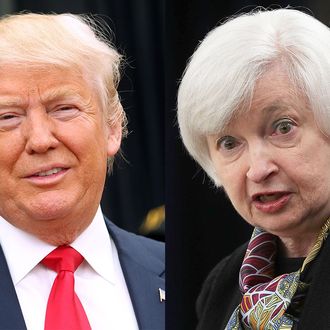
In a quintessentially Trumpian manner, the front-running Republican presidential candidate was of two minds about monetary policy in an interview with Fortune Tuesday, indicating he liked the Fed’s low interest rates but not Fed chairwoman Janet Yellen herself.
Trump was emphatic about low interest rates being an advantage in dealing with public debt, and in keeping the economy afloat. But he couldn’t help but worry about those virtuous folk who benefit from high interest rates, along with banks and major investors:
“The problem with low interest rates is that it’s unfair that people who’ve saved every penny, paid off mortgages, and everything they were supposed to do and they were going to retire with their beautiful nest egg and now they’re getting one-eighth of 1%,” says Trump. “I think that’s unfair to those people.”
In the past Trump has made similar sympathetic noises about the thrifty savers getting screwed by low interest rates, as befits the candidate of a party with many white upper-middle-class retirees who feel their hard-earned wealth is being leeched away by economic policies aimed at helping those people who aren’t so financially prudent, doncha know. Moreover, Trump has spoken positively about ultimately bringing back that great totem of the hard-money enthusiasts, the gold standard.
It’s a shame the remaining GOP candidates cannot have a debate focused on this topic, but there’s not much doubt where Trump’s rivals stand. At the much-maligned CNBC debate last October, Ted Cruz (another devotee of the Cult of the Golden Calf) attacked low interest rates as the cause of all this runaway inflation (yes, that’s absurd, but it’s what he implied) we’ve all been experiencing: “A single mom buying groceries, she sees hamburger prices going up nearly 40 percent,” Cruz said. “She sees her costs of electricity going up. She sees her health insurance going up, and loose money is one of the major problems.”
Critics were quick to remind Cruz that droughts in his own state, not monetary policy, were largely responsible for those high hamburger prices, and that electricity and even health insurance prices had plateaued. Inflation is the least of the country’s economic problems. But Cruz probably isn’t open to persuasion since hard money and tight credit are matters of ideological conviction rather than empirical analysis for most orthodox conservatives. That seems to be the case for John Kasich as well, as Paul Krugman noted after a January 2016 debate:
Ted Cruz has gotten some scrutiny, although not enough, for his goldbuggism. But Kasich, when asked why wages have stagnated, gave as his number one reason “because the Federal Reserve kept interest rates so low” — because this diverted investment into stocks, or something. No, it doesn’t make any sense — but it tells you that he is viscerally opposed to monetary as well as fiscal stimulus in the face of high unemployment.
So no, Kasich isn’t sensible. He’s just off the wall in ways that differ in some ways from the GOP mainstream. If he’d been president in 2009-10, we’d have had a full replay of the Great Depression.
Given these alternatives, perhaps Trump having half a mind to keep interest rates low is the best we can hope for from Republicans on monetary policy.






























